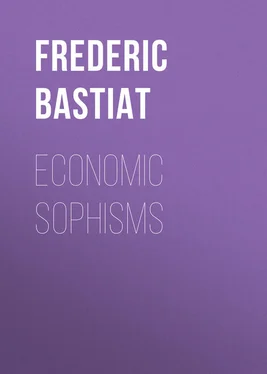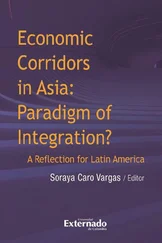Frederic Bastiat - Economic Sophisms
Здесь есть возможность читать онлайн «Frederic Bastiat - Economic Sophisms» — ознакомительный отрывок электронной книги совершенно бесплатно, а после прочтения отрывка купить полную версию. В некоторых случаях можно слушать аудио, скачать через торрент в формате fb2 и присутствует краткое содержание. ISBN: , Жанр: foreign_antique, foreign_prose, на английском языке. Описание произведения, (предисловие) а так же отзывы посетителей доступны на портале библиотеки ЛибКат.
- Название:Economic Sophisms
- Автор:
- Жанр:
- Год:неизвестен
- ISBN:http://www.gutenberg.org/ebooks/44145
- Рейтинг книги:3 / 5. Голосов: 1
-
Избранное:Добавить в избранное
- Отзывы:
-
Ваша оценка:
- 60
- 1
- 2
- 3
- 4
- 5
Economic Sophisms: краткое содержание, описание и аннотация
Предлагаем к чтению аннотацию, описание, краткое содержание или предисловие (зависит от того, что написал сам автор книги «Economic Sophisms»). Если вы не нашли необходимую информацию о книге — напишите в комментариях, мы постараемся отыскать её.
Economic Sophisms — читать онлайн ознакомительный отрывок
Ниже представлен текст книги, разбитый по страницам. Система сохранения места последней прочитанной страницы, позволяет с удобством читать онлайн бесплатно книгу «Economic Sophisms», без необходимости каждый раз заново искать на чём Вы остановились. Поставьте закладку, и сможете в любой момент перейти на страницу, на которой закончили чтение.
Интервал:
Закладка:
Both theses have been maintained; and in political economy they have divided the region of opinion and of thought.
According to the first system, wealth is the result of labour, increasing as the relative proportion of result to effort increases . Absolute perfection, of which God is the type, consists in the infinite distance interposed between the two terms – in this sense, effort is nil , result infinite.
The second system teaches that it is the effort itself which constitutes the measure of wealth. To make progress is to increase the relative proportion which effort bears to result . The ideal of this system may be found in the sterile and eternal efforts of Sisyphus. 5 5 For this reason, and for the sake of conciseness, the reader will pardon us for designating this system in the sequel by the name of sisyphism .
The first system naturally welcomes everything which tends to diminish pains and augment products ; powerful machinery which increases the forces of man, exchange which allows him to derive greater advantage from natural agents distributed in various proportions over the face of the earth, intelligence which discovers, experience which proves, competition which stimulates, etc.
Logically, the second invokes everything which has the effect of increasing pains and diminishing products; privileges, monopolies, restrictions, prohibitions, suppression of machinery, sterility, etc.
It is well to remark that the universal practice of mankind always points to the principle of the first system. We have never seen, we shall never see, a man who labours in any department, be he agriculturist, manufacturer, merchant, artificer, soldier, author, or philosopher, who does not devote all the powers of his mind to work better, to work with more rapidity, to work more economically – in a word, to effect more with less .
The opposite doctrine is in favour only with theorists, deputies, journalists, statesmen, ministers – men, in short, born to make experiments on the social body.
At the same time, we may observe, that in what concerns themselves personally, they act as every one else does, on the principle of obtaining from labour the greatest possible amount of useful results.
Perhaps I may be thought to exaggerate, and that there are no true sisyphists .
If it be argued that in practice they do not press their principle to its most extreme consequences, I willingly grant it. This is always the case when one sets out with a false principle. Such a principle soon leads to results so absurd and so mischievous that we are obliged to stop short. This is the reason why practical industry never admits sisyphism ; punishment would follow error too closely not to expose it. But in matters of speculation, such as theorists and statesmen deal in, one may pursue a false principle a long time before discovering its falsity by the complicated consequences to which men were formerly strangers; and when at last its falsity is found out, the authors take refuge in the opposite principle, turn round, contradict themselves, and seek their justification in a modern maxim of incomparable absurdity: in political economy, there is no inflexible rule, no absolute principle.
Let us see, then, if these two opposite principles which I have just described do not predominate by turns, the one in practical industry, the other in industrial legislation.
I have already noticed the saying of M. Bugeaud (that "when bread is dear, agriculturists become rich"); but in M. Bugeaud are embodied two separate characters, the agriculturist and the legislator.
As an agriculturist, M. Bugeaud directs all his efforts to two ends, – to save labour, and obtain cheap bread. When he prefers a good plough to a bad one; when he improves his pastures; when, in order to pulverize the soil, he substitutes as much as possible the action of the atmosphere for that of the harrow and the hoe; when he calls to his aid all the processes of which science and experiment have proved the efficacy, – he has but one object in view, viz., to diminish the proportion of effort to result . We have indeed no other test of the ability of a cultivator, and the perfection of his processes, than to measure to what extent they have lessened the one and added to the other. And as all the farmers in the world act upon this principle, we may assert that the effort of mankind at large is to obtain, for their own benefit undoubtedly, bread and all other products cheaper, to lessen the labour needed to procure a given quantity of what they want.
This incontestable tendency of mankind once established, should, it would seem, reveal to the legislator the true principle, and point out to him in what way he should aid industry (in as far as it falls within his province to aid it); for it would be absurd to assert that human laws should run counter to the laws of Providence.
And yet we have heard M. Bugeaud, as a deputy, exclaim: "I understand nothing of this theory of cheapness; I should like better to see bread dearer and labour more abundant." And following out this doctrine, the deputy of the Dordogne votes legislative measures, the effect of which is to hamper exchanges, for the very reason that they procure us indirectly what direct production could not procure us but at greater expense.
Now, it is very evident that M. Bugeaud's principle as a deputy is directly opposed to the principle on which he acts as an agriculturist. To act consistently, he should vote against all legislative restriction, or else import into his farming operations the principle which he proclaims from the tribune. We should then see him sow his corn in his most sterile fields, for in this way he would succeed in working much to obtain little . We should see him throwing aside the plough, since hand-culture would satisfy his double wish for dearer bread and more abundant labour.
Restriction has for its avowed object, and its acknowledged effect, to increase labour.
It has also for its avowed object, and its acknowledged effect, to cause dearness, which means simply scarcity of products; so that, carried out to its extreme limits, it is pure sisyphism , such as we have defined it, — labour infinite, product nil .
Baron Charles Dupin, the light of the peerage, it is said, on economic science, accuses railways of injuring navigation ; and it is certain that it is of the nature of a more perfect, to restrict the use of a less perfect means of conveyance. But railways cannot hurt navigation except by attracting traffic; and they cannot attract traffic but by conveying goods and passengers more cheaply; and they cannot convey them more cheaply but by diminishing the proportion which the effort employed bears to the result obtained , seeing that that is the very thing which constitutes cheapness. When, then, Baron Dupin deplores this diminution of the labour employed to effect a given result, it is the doctrine of sisyphism which he preaches. Logically, since he prefers the ship to the rail, he should prefer the cart to the ship, the pack-saddle to the cart, and the pannier to all other known means of conveyance, for it is the latter which exacts the most labour with the least result.
"Labour constitutes the wealth of a people," said M. de Saint-Cricq, that Minister of Commerce who has imposed so many restrictions upon trade. We must not suppose that this was an elliptical expression, meaning, "The results of labour constitute the wealth of a people." No, this economist distinctly intended to affirm that it is the intensity of labour which is the measure of wealth, and the proof of it is, that from consequence to consequence, from one restriction to another, he induced France (and in this he thought he was doing her good) to expend double the amount of labour, in order, for example, to provide herself with an equal quantity of iron. In England, iron was then at eight francs, while in France it cost sixteen francs. Taking a day's labour at one franc, it is clear that France could, by means of exchange, procure a quintal of iron by subtracting eight days' work from the aggregate national labour. In consequence of the restrictive measures of M. de Saint-Cricq, France was obliged to expend sixteen days' labour in order to provide herself with a quintal of iron by direct production. Double the labour for the same satisfaction, hence double the wealth. Then it follows that wealth is not measured by the result, but by the intensity of the labour. Is not this sisyphism in all its purity?
Читать дальшеИнтервал:
Закладка:
Похожие книги на «Economic Sophisms»
Представляем Вашему вниманию похожие книги на «Economic Sophisms» списком для выбора. Мы отобрали схожую по названию и смыслу литературу в надежде предоставить читателям больше вариантов отыскать новые, интересные, ещё непрочитанные произведения.
Обсуждение, отзывы о книге «Economic Sophisms» и просто собственные мнения читателей. Оставьте ваши комментарии, напишите, что Вы думаете о произведении, его смысле или главных героях. Укажите что конкретно понравилось, а что нет, и почему Вы так считаете.












